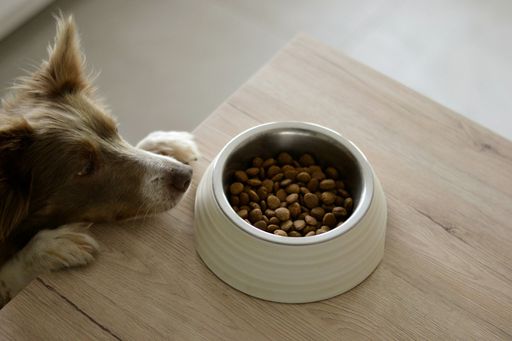The German shorthaired pointer (GSP) is traditionally a bird-hunting breed but is quickly gaining popularity as a loyal and loving family dog. A high-energy breed, GSPs have above-average needs when it comes to nutrition. As with all dog breeds though, the dog food you choose to feed your GSP will impact it's health, including important factors such as weight, energy, as well as skin and coat health. It’s important to know what is and isn’t safe to feed your GSP, and consult your vet if you have any questions. Here are a few suggestions for feeding the GSP in your life.
High-Quality Commercial Dog Food
There’s a reason low-priced pet food is low-priced. When you give your GSP inexpensive dog food, you are sacrificing nutrition for cheap fillers. Because your GSP is so active, you may find you need to feed more to maintain proper weight, energy and satiety. By feeding a high-quality diet upfront, you can set your puppy up for a healthy life from the start. View your ultimate pet nutrition offers and discover proper diet and nutrition needs for your dog. What does a superior commercial dog food look like? It actually looks similar to a quality human diet. Look for proteins like chicken, fish or eggs as the first ingredient listed. Then, you’ll want to see easily-digestible carbohydrates such as rice or oats that provide quick energy bursts. The need for carbohydrates is controversial among pet lovers, with many believing that dogs perform better on high-protein, high-fat diets. You can make the decision you think is best for your pup. However, before considering a grain-free dog food formula for your GSP, make sure you consult a veterinarian about the possible link to a disease called Dilated Cardiomyopathy (DCM). Additionally, pay close attention to ingredients in large-breed dog foods, which usually contain fewer calories. GSPs may be considered large, but they still need many calories because they are very active.
Because GSPs are typically energetic into their senior years, they should eventually graduate to a diet specially formulated for senior dogs, while also considering any health conditions requiring a specialized diet or supplements.
Homemade Dog Food
Even though some commercial dog foods are very high-quality, spouting “all-natural” and “organic” claims, they are still highly processed, which has many pet parents questioning the nutritional value, and instead turning to homemade pet-safe, human-grade food recipes. One of the benefits to making your dog’s dinner yourself is the exact knowledge of everything that goes into Fido’s food bowl. If fresh ingredients are considered the highest quality, then you have the advantage in building your GSP’s vitality and immunity for a strong body and healthy life. Plus, feeding a homemade wet food can ensure easy digestion. Because GSPs are a large, deep-chested dog breed, they can be susceptible to Gastric Dilatation and Volvulus or bloat, an emergency gastrointestinal syndrome requiring immediate vet care. Focus on those fresh ingredients like chicken, fish, turkey, eggs, or sweet potato. Cooked brown or white rice are great sources of healthy carbs and moisture. Avoid peas or potatoes if your GSP has a sensitive tummy. Avoid onions and garlic and never season dog food with spices as you would with your own dinner. Consider adding a probiotic to maintain a healthy gut while you work out the perfect recipes for your best friend. Ask your vet for recommendations.
Treats and Snacks
German Shorthaired pointers are people pleasers, and they love to be rewarded for their good behavior. They especially enjoy sharing whatever snack you happen to be enjoying at the time. However, they can’t have everything you can, so be aware of safe, appropriate treats. Try offering carrots for a sweet snack; they are full of Beta Carotene and dogs love them. Green beans are great for extra fiber, but a picky Fido may want them steamed first. Plain bread is fine in small amounts and your GSP will practically do back flips for a little bit of cheese, which is also the perfect vessel for hiding and delivering any medications. Of course, chocolate and cinnamon are no-no’s, but coconut and honey are perfectly fine and you may notice your GSP’s coat getting even softer and shinier. As always, get your vet’s opinion before you give your pet any snacks that you aren’t sure about.
The average life expectancy of a German shorthaired pointer is 12-14 years. That’s a lot of time to cuddle and play with your best furry friend. Whether you choose to feed a commercial food or make your own dog food formula at home, you can guarantee a high-quality diet composed of nutrient-rich ingredients, and your GSP can remain strong, healthy and happy for many, many years.



















